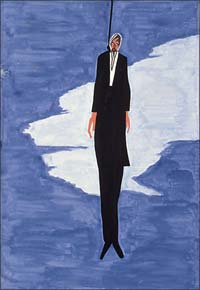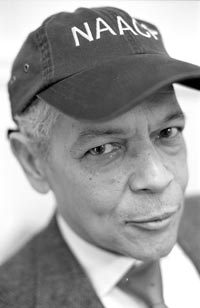
NAACP honors John Brown
The Associated Press (July 15, 2006)
BALTIMORE — About 74 years ago, W.E.B. Du Bois led the NAACP from the group’s convention in Washington to a historically black college in Harpers Ferry, W. Va., to lay a tablet to honor militant abolitionist John Brown.
But Storer College officials objected, saying it was too militant.
Friday, as the NAACP gathered for its 97th convention in Washington, the group’s officials took a vintage train ride to Harpers Ferry to lay a tablet in a town where Brown captured a government arsenal in 1859.
Julian Bond, the chairman of the National Association for the Advancement of Colored People, said the raid sent shock waves through the country — 16 months before the Civil War — spreading fear in the white South and causing abolitionists in the North to celebrate Brown’s actions as heroic.
“Most condemned the violence but celebrated the impulse, and I think that that’s generally true today,” Bond said. “They’re not celebrating the violence that he perpetuated. They’re celebrating his commitment to racial justice, and we think it’s fitting to continue that celebration.”
The tablet laid Friday includes the original language, which expresses the NAACP’s gratitude for Brown’s actions. It is the same design and layout of the original.
“With him fought seven slaves and sons of slaves,” the tablet says. “Over his crucified corpse marched 200,000 black soldiers and 4,000,000 freedmen singing ‘John Brown’s body lies a-mouldering in the grave but his soul goes marching on!”’
The re-enactment was part of a series of NAACP events leading to the organization’s centennial celebration in 2009.
In the late 1850s, Brown and 21 others occupied the arsenal at Harpers Ferry in what is now West Virginia to start a “war of emancipation.” The next day, a company of Marines under Col. Robert E. Lee took Brown’s last stronghold by assault. Ten people were killed or mortally wounded, including two of Brown’s 20 children.
Brown was convicted of treason to the Virginia Commonwealth and conspiracy to murder.
Harpers Ferry has a special place in the history of the NAACP. It was where the Niagara Movement, which Du Bois founded as the cornerstone of the modern civil rights movement, held its first meeting on U.S. soil in 1906. (The first meeting was in Canada.)

Julian Bond's Shabby Defense of John Brown
by Louis A. DeCaro Jr.
It is well and good that the NAACP would acknowledge John Brown in following the example of civil rights leaders in 1906, as well as following the lead of the Congress on Racial Equality (CORE), whose leaders placed a wreath on Brown's grave this past May.
However Julian Bond's remark to the effect that the NAACP is "not celebrating the violence that he perpetuated" is insulting and shows the extent to which Bond's understanding of Brown has been imprinted with historical error, and perhaps even reveals a level of intimidation and hypocrisy in the thinking of the civil rights leader.
For an African American leader to speak of John Brown "perpetuating" violence in the context of a nation steeped in slavery and racism is not only proof of deficiency in historical understanding, but an insult to the man he claims to be honoring. Bond is undoubtedly sincere and well-meaning, but his remarks class him among a set of 20th century black intellectuals who embraced the status quo profile of John Brown contrived mainly by elitist European American male scholars. In contrast to fearless, unapologetic black writers like Lerone Bennett and John O. Killens, Julian Bond joins the ranks of black "admirers" like Benjamin Quarles and Ralph Ellison, who were apparently intimidated by the reactionary historical ban on John Brown that prevails in liberal and conservative narratives. Like Quarles and Ellison, Bond would both praise and incriminate Brown at the same time, putting forth his lame distinction between Brown's alleged role in "perpetuating violence" and his sterling commitment to racial justice.
John Brown did nothing to “perpetuate violence” despite all the rhetoric and hearsay that is reported as history in the United States. Indeed there is still a lack of fair and accurate analysis of Brown's efforts in Kansas and Virginia, and despite his role in certain violent episodes, it is highly unfair to blame him for perpetuating the theater of blood and brutality that was the United States in the 19th century. As the historical record actually shows, John Brown made every effort to conduct a campaign of minimalist force in Virginia, endeavoring to destroy the economy of slavery without massacre and insurrection. When initiation of that plan failed at Harper's Ferry in 1859, Brown happily went to the gallows to demonstrate his commitment to opposing slavery with every fiber of his being.
John Brown could do without the shabby apologetics of Julian Bond. His timid remarks are a far cry from that of Frederick Douglass who, at Harper's Ferry in 1881, emphatically declared that when "John Brown stretched forth his arm the sky was cleared. The time for compromises was gone – the armed hosts of freedom stood face to face over the chasm of a broken Union – and the clash of arms was at hand. The South staked all upon getting possession of the Federal Government, and failing to do that, drew the sword of rebellion and thus made her own, and not Brown's, the lost cause of the century."
No comments:
Post a Comment